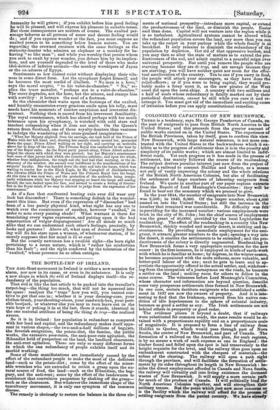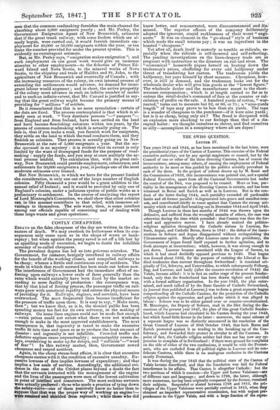COLONIZING CAPACITIES OF NEW BRUNSWICK. THERE is a tendency, says
Mr. George Pemberton of Canada, on the part of emigrants to pass from British North America to the United States; and this proceeds from the greater amount of public works carried on in the United States. The experience of the British Provinces, taken by itself, goes to confirm this view. New Brunswick, with large natural resources, is not more con- trasted with the United States in the backwardness which it ex- hibits as to the progress of settlement than it is in the paucity and simplicity of its public works ; which are almost limited to indif- ferent roads. Yet such progress as it has made in the process of - - settlement, has mainly followed the course of its roadmaking. The subject derives peculiar interest just now from the project of forming a railroad to connect Halifax and Quebec, as a means not only of vastly improving the colony and the whole relations of the British North American Colonies, but also of facilitating the settlement of large numbers of labouring emigrants from Ireland. We quote in another part of our paper copious extracts from the Report of Lord Monteagle's Committee: they will be found to bear out the summary which we proceed to give. In the year 1844, the number of emigrants into New Brunswick was 2,500; in 1846, 9,500. Of the larger number, about 4,500 passed on into the United States ; but still the increase in the number that remained was considerable. No difficulty was felt r in providing for the increased number: various employments were brisk in the city of St. John ; but the chief source of employment was the grant of 40,0001. provided by the local Legislature for roadmaking. The effect of the roadmaking in a country like New Brunswick, thickly wooded and mostly desert, is striking and in- stantaneous. By providing immediate employment for the emi- grant, it attracts greater numbers to the spot ; opening a way into the desert, it enables the settlements to be extended ; and the pro- ductiveness of the colony is directly augmented. Roadmaking in New Brunswick forms a very appropriate occupation for the new corner : in the first instance, he is employed in kinds of earth-work with which he is familiar at home ; by degrees, in the winter season, he becomes acquainted with the more arduous, more valuable, and better-paid labour of the axe ; next he gets to learn and to ap- pretiate the opportunity offered to the actual settler, and, withdraw- ing from the occupation of a journeyman on the roads, he becomes a settler on the land ; making room for others to follow in the same course. The witnesses before Lord Monteagle's Committee, whose character and information are beyond question, describe some very prosperous settlements thus formed in New Brunswick. In one case, certain destitute emigrants who established a settle-. ment in 1837 are now the owners of property. And it is inte- resting to find that the Irishman, removed from his native con- dition of idle hopelessness to the sphere of colonial industry, becomes as good a settler as any. The Irish settlements are not behind others in prosperity or good order.
The evidence places it beyond a doubt, that if railways were substituted for common roads, the same results would be at- tained with a proportionate rapidity and on a proportionate scale of magnitude. It is proposed to form a line of railway from Halifax to Quebec, which would pass through part of Nova Scotia, the centre of New Brunswick, and part of Canada. The formation of a railroad on the American plan, for such regions, is by no means a work of such expense as one in England : the timber found and felled upon the spot is laid transversely to the height requisite for the level, and the railway thus goes upon an embankment constructed with the cheapest of materials—the refuse of the clearing. The railway will open a path right through the province, and will facilitate the formation of settle- ments by its sides throughout its length in New Brunswick : be- sides the direct employment afforded in Canada and Nova Scotia, the railway will virtually call into living existence the dormant wastes of New Brunswick. It will supply a more certain path for much of the produce of Canada. It will politically bind the North American Colonies together, and will strengthen their military tenure. But the point which just now most concerts us is the facility which the railway will afford for the prooese. of settling emigrants from the parent country. We have already,
seen that the common roadmaking furnishes the main channel for absorbing about 5,000 emigrants yearly ; and Mr. Perley, the Government Emigration Agent of New Brunswick, estimates that if the great trunk railway, with some feeders which are al- ready begun, were carried out, it would furnish immediate em- ployment for 40,000 or 50,000 emigrants within the year, or ten times the number provided for under the present system. This is evidently no extravagant estimate.
But, as Mr. Perley says, " emigration makes emigration "; and such employment on one great work would give an immense stimulus to other employments—to the fisheries of Prince Ed- ward Island and Nova Scotia, to the mineral works of Nova Scotia, to the shipping and trade of Halifax and St. John, to the agriculture of New Brunswick and eventually of Canada ; with the increasing resources of the colony, its own internal process of extending the settlements would advance, its demand for immi- grant labour would augment ; and in short., the active prosperity of the colony must advance in such an infinite number of modes and to such an infinite extent, that Mr. Cunard is justified in say- ing that the great railway might become the primary means of providing for " millions ' of settlers. Be it remembered that this is no mere speculation : certain of the data are fixed. The process contemplated is that which is al- ready seen at work. " Very destitute persons "—" paupers "- from England and from Ireland, have been settled on the land and have become flourishing colonists within ten years, by the process of common roadmaking which is actually going on. The rule is, that if you make a road, you furnish work for emigrants, they settle on the land to which the road conducts them, and they flourish as colonists. That process is actually going on in New Brunswick at the rate of 5,000 emigrants a year. But the mo- dus operandi is no mystery : it is evident that its extent is only limited by the want of disengaged funds for the purpose of road- making : supply the funds, and you may at once multiply the ac- tual process tenfold. The calculation that, with its great rail- way, New Brunswick could provide employment, subsistence, and settlements for 50,000 emigrants a year, is perhaps one of the most moderate estimates ever framed.
But New Brunswick, to which we have for the present limited the consideration, is only one out of the large number of English colonies. Fifty thousand ayear would be a great addition to the annual relief of. Ireland ; and it would be provided by only one of England's colonies, under a judicious system of public works as a preliminary to settlement. In the course of analyzing the report of Lord Monteagle's Committee, we shall show that other colonies can in like manner contribute to that relief, with immense ad- vantage to themselves. The sole want, then, is some intellect among our officials capable of conceiving and of dealing with these large wants and great operations.



























 Previous page
Previous page